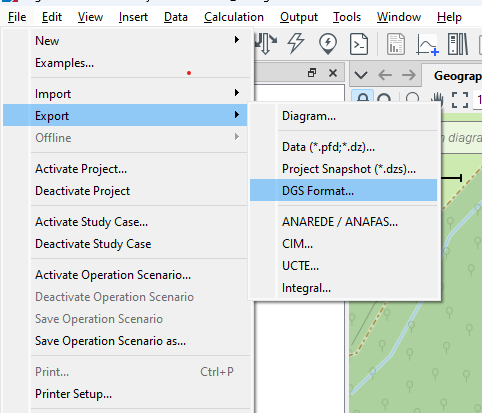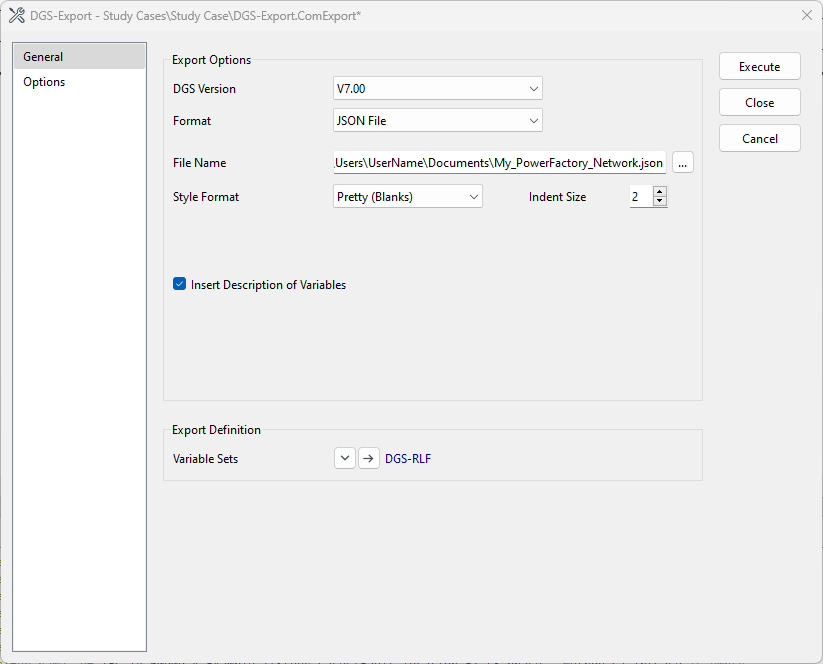Data Exchange¶
roseau-load-flow provides some converters for data exchange from other known power system simulation
tools.
Power Factory¶
Importing PowerFactory networks in roseau-load-flow can be done using the DIgSILENT Interface
for Geographical Informations Systems (DGS) JSON format.
The following components are currently supported:
Name |
Description |
RLF Element |
|---|---|---|
ElmXnet |
External Grid |
VoltageSource |
ElmTerm |
Terminal |
Bus |
StaCubic |
Cubicle |
N/A |
ElmTr2 |
2-Winding Transformer |
Transformer |
TypTr2 |
2-Winding Transformer Type |
TransformerParameters |
ElmCoup |
Switch |
Switch |
ElmLne |
Line/Cable |
Line |
TypLne |
Line/Cable Type |
LineParameters |
ElmLodLV |
Load, low voltage |
PowerLoad (P>=0) |
ElmLodmv |
Load, medium voltage |
PowerLoad (P>=0 or P<0) |
ElmLod |
General load |
PowerLoad (P>=0) |
ElmGenStat |
Static Generator |
PowerLoad (P<=0) |
ElmPvsys |
PV System |
PowerLoad (P<=0) |
Export from PowerFactory¶
roseau-load-flow provides an “Export Definition Folder” to configure the DGS export in the form
of a pfd file called DGS-RLF.pfd. This file contains a “Monitor Variable” (IntMon) object for
each class that should be exported.
Use the
ElectricalNetwork.dgs_export_definition_folder_path()
method to get the location of this file:
>>> print(rlf.ElectricalNetwork.dgs_export_definition_folder_path())
/home/my_user/my_project/.venv/lib/python3.12/site-packages/roseau/load_flow/data/io/DGS-RLF.pfd
Then drag-and-drop this file into your PowerFactory project to use it as “Export Definition Folder”.
With the folder now available in PowerFactory, make sure you have your project activated then export
the network to DGS, click on the File menu then hover over Export and choose DGS Format...
from the list like so:

A “DGS-Export” window will open, set the “Export Options” and “Export Definition” as shown in the following picture:

Note that the “Variable Sets” field in the “Export Definition” section is set to the DGS-RLF file
provided by roseau-load-flow.
Click on Execute to finish the export.
Import into Roseau Load Flow¶
To import a PowerFactory network in roseau-load-flow, use the
ElectricalNetwork.from_dgs() method:
>>> rlf.ElectricalNetwork.from_dgs("my_dgs_network.json")
<ElectricalNetwork: 6 buses, 5 branches, 8 loads, 1 source, 1 ground, 1 potential ref>
Limitations¶
Please note that there are some limitations in the supported features:
Required elements: the network is expected to have at least one of the following elements:
External Grid (
ElmXnet)Terminal (
ElmTerm)Cubicle (
StaCubic)
Ignored elements: elements that are not mentioned in the table above are ignored;
Ignored attributes: functionality that is not yet available in
roseau-load-flowis ignored. This includes the state of the switches (switches are considered to be always closed);
Lines and Transformers¶
In addition to the DGS import support, roseau-load-flow supports creating lines and transformers
parameters from PowerFactory data. This is useful when you don’t want to import a whole network but
would like to use some of the lines and transformers models you have in a power factory project.
To create line parameters from a PowerFactory Line Type (TypLne) object, use the
LineParameters.from_power_factory() method.
To create transformer parameters from a PowerFactory 2-Winding Transformer Type (TypTr2) object, use the
TransformerParameters.from_power_factory()
method.
OpenDSS¶
roseau-load-flow supports creating lines and transformers from OpenDSS data.
To create line parameters from an OpenDSS LineCode object, use the
LineParameters.from_open_dss() method. For
example, the DSS command New linecode.240sq nphases=3 R1=0.127 X1=0.072 R0=0.342 X0=0.089 units=km
translates to:
>>> lp = rlf.LineParameters.from_open_dss(
... id="240sq",
... nphases=3, # creates 3x3 Z,Y matrices
... r1=Q_(0.127, "ohm/km"),
... x1=Q_(0.072, "ohm/km"),
... r0=Q_(0.342, "ohm/km"),
... x0=Q_(0.089, "ohm/km"),
... c1=Q_(3.4, "nF/km"), # default value used in OpenDSS code
... c0=Q_(1.6, "nF/km"), # default value used in OpenDSS code
... )
To create a transformer from an OpenDSS 2-winding Transformer object, use the
TransformerParameters.from_open_dss()
method to create the transformer parameters. For example, the DSS command
DSSText.Command = "New transformer.LVTR Buses=[sourcebus, A.1.2.3] Conns=[delta wye] KVs=[11, 0.4] KVAs=[250 250] %Rs=0.00 xhl=2.5 %loadloss=0 "
translates to:
>>> tp_dss = rlf.TransformerParameters.from_open_dss(
... id="LVTR-parameters",
... conns=("delta", "wye"),
... kvs=(11, 0.4),
... kvas=(250, 250), # alternatively pass a scalar `kvas=250`
... leadlag="euro", # THE ONLY OPENDSS MODEL WE CURRENTLY SUPPORT
... xhl=2.5,
... loadloss=0,
... noloadloss=0, # default value used in OpenDSS
... imag=0, # default value used in OpenDSS
... rs=0, # redundant with `loadloss=0`
... )
>>> transformer = rlf.Transformer(
... id="LVTR",
... bus1=sourcebus, # supposedly created already
... bus2=A, # supposedly created already
... parameters=tp_dss,
... )
Roseau Load Flow (JSON)¶
roseau-load-flow defines a proprietary JSON format for the serialization of electrical networks.
To write an electrical network to a file, use the
ElectricalNetwork.to_json() method:
>>> en.to_json("my_network.json")
Warning
The to_json method will overwrite the file if it already exists.
To load the network from a JSON file, use the
ElectricalNetwork.from_json() method.
>>> en = rlf.ElectricalNetwork.from_json("my_network.json")
By default, the to_json and from_json methods will include the load flow results if they are
available and valid. If you want to save/load the network without the results, you can pass
include_results=False to these methods.
Calling the to_json() method on a network with invalid results (say after an element has been
modified) will raise an exception. In this case, you can use the include_results=False option to
ignore the results, or you can call the solve_load_flow() method to update the results before
saving the network.
Important
We do not recommend modifying the JSON file manually. The content of the JSON file is not
guaranteed to be stable across different versions of the library and should be considered an
implementation detail. Any changes to the JSON file should be done through the
ElectricalNetwork object otherwise it may lead to unexpected behavior.